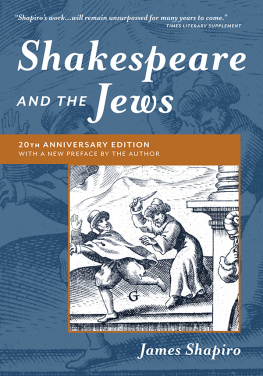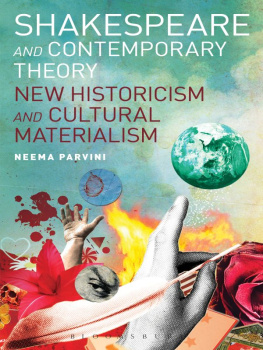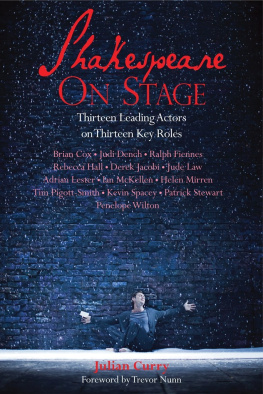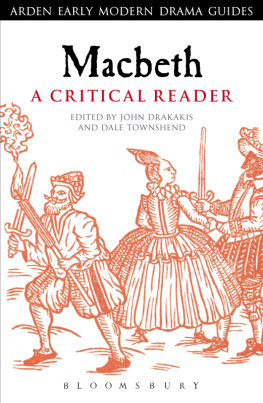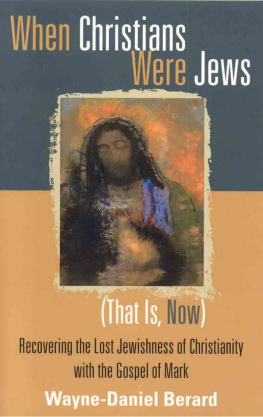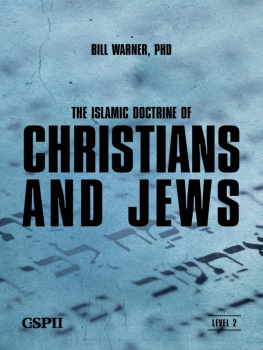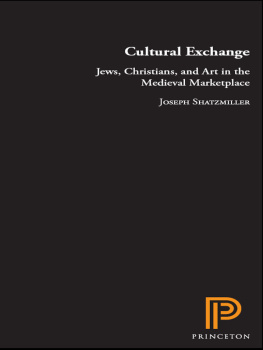Table of Contents
 Shakespeare
ShakespeareAND THE
Jews
 Shakespeare
ShakespeareAND THE Jews
J AMES S HAPIRO
Twentieth Anniversary Edition
With a New Preface
Columbia University Press
NEW YORK
Columbia University Press
Publishers Since 1893
New York Chichester, West Sussex
cup.columbia.edu
Copyright 2016 Columbia University Press
Preface 2016 Columbia University Press
All rights reserved
E-ISBN 978-0-231-54187-9
ISBN 9780-23117867-9 (pbk.: alk. paper)
ISBN 9780-23154187-9 (e-book)
Library of Congress Control Number : 2015959984
A Columbia University Press E-book.
CUP would be pleased to hear about your reading experience with this e-book at .
Cover image: Detail from Thomas Coryates Coryats Crudities.
Courtesy of the Huntington Library
References to websites (URLs) were accurate at the time of writing. Neither the author nor Columbia University Press is responsible for URLs that may have expired or changed since the manuscript was prepared.
 Contents
ContentsWhen I wrote this book twenty years ago, there were things that I had failed to see. I ended Shakespeare and the Jews with a plea that, however uncomfortable the play made Jews feel, it would be a mistake to censor or suppress The Merchant of Venice. For, like a canary in a coal mine, the play in performance identified what was often undetectable in a culture: the presence of noxious and residual bigotry.
At the time I began my research, productions of The Merchant of Venice still generated the sort of controversy rarely seen today; the play remained a risky one to produce, at least in New York City, where I grew up and now taught. Those in the theater worldand in the Jewish community as wellhad not forgotten the blowback in 1962 when Joe Papp decided to inaugurate the New York Shakespeare Festival in Central Park with the play. Papp had cast George C. Scott as Shylock; it didnt help that the actors portrayal was deeply sympathetic (I played Shylock as though he were dead right, Scott later said, and that he was screwed). Invoking the Holocaustthose grisly events of the recent pastthe New York Board of Rabbis protested in a letter to the New York Times that Shakespeares play offered a distortion and defamity of our people and our faith, and members of the Jewish War Veterans picketed in an unsuccessful campaign to ban a telecast of Papps production to two million television viewers.
A decade after Shakespeare and the Jews was published, New Yorks Theatre for a New Audience decided to stage the play. I was brought in to help out with the production, and I was asked to come along, no doubt because of what I had written, when the founder of the theater company arranged a meeting with a representative of a national Jewish organization; it would help to know whether the production would lead to fresh protests. With that encounter still in mind, I arrived at the first read-through a week or so later, where I was surprised to see, seated rather stiffly with his back to me at the rehearsal table alongside members of the cast, a man in a dark suit with a small black kipah on his head, a kind favored by modern Orthodox Jews. I swore quietly to myself, wondering how a Jewish organization had managed to infiltrate the rehearsal room.
Only when the man wearing the kipah started reading the part of Shylock did I realize that he was F. Murray Abraham, the Academy Award-winning actor, who had come to the first rehearsal already in character. He proved to be a powerful and restrained Shylock, the best I have ever seen. There was no public protest, nor was there any when that production was staged not long after as part of a Royal Shakespeare Company festival in Stratford-upon-Avon, nor would there be a few years later when Al Pacino played Shylock at the Delacorte Theater in Central Parkfor the first time since George C. Scott had done soand subsequently on Broadway. The anxiety that Jews felt about seeing the play performed, still palpable when I was writing Shakespeare and the Jews, seemed to have all but disappeared.
I had turned in the manuscript of Shakespeare and the Jews over a year before it was eventually published, and in the interim I was invited to lecture in Israel. During my visit I learned that a production of The Merchant of Venice, in Hebrew, was being staged at the Cameri Theater in Tel Aviv, and I went to see it. I was aware of the plays complicated history in Israel, how in the 1930s, even before the creation of the State of Israel, there had been a trial of the play by Jewish intellectuals who debated whether it should be staged at all, with those in favor prevailing. And I had noted in the closing pages of my book that when the British director Barry Kyle staged a production in Israel in 1980, he had been prevailed upon to omit Shylocks consent to become a Christian. I was curious to see what this latest version of the play might reveal about Israel in 1994, in the aftermath of the First Intifada, a quarter-century of occupation in the West Bank and Gaza, and the recent signing of the Oslo Accords.
The production at the Cameri was directed by Omri Nitzan and starred Yossi Graber as Shylock. I found it a bit jarring at first watching a version of the play in Hebrew, with an all-Jewish company, but the production was riveting and these distractions soon forgotten. At the outset, Grabers Shylock seemed predictable, familiar from any number of contemporary productions: an assimilated and secular Jewish businessman. But after his daughter Jessica abandons him, he became radicalized, shockingly so. When his Christian adversaries taunt him in act 3, an enraged Shylock pantomimes spraying them with bullets from an imaginary submachine gun. And by the trial scene in act 4by which time he had grown a beard and wore a large white kipah, the kind associated with right-wing West Bank settlershis transformation into what the director called a Jewish terrorist was complete.
I subsequently learned that the production had itself sharply changed course in the midst of rehearsals. Its translator and dramaturge, the Shakespeare scholar Avraham Oz, recalled arriving at rehearsals on the day that Nitzan decided to transform the vengeful Shylock of acts 3 and 4into the image of a Jewish settler in the West Bank. What had prompted that change was the massacre the previous day of twenty-nine Muslim worshippers and the wounding of 125 others at the Cave of the Patriarchs in Hebron, a site sacred to both Jews and Muslims. The mass murderer would no doubt have shot even more of those at prayer had not some of the survivors managed to subdue and beat him to death. The killer, dressed in his Israeli army uniform, was a Jewish doctor: Baruch Goldstein, an American-born, thirty-seven-year-old West Bank settler.
Not everyone who saw the production found all this as chilling as I did. The right-leaning reviewer for the Jerusalem Post

